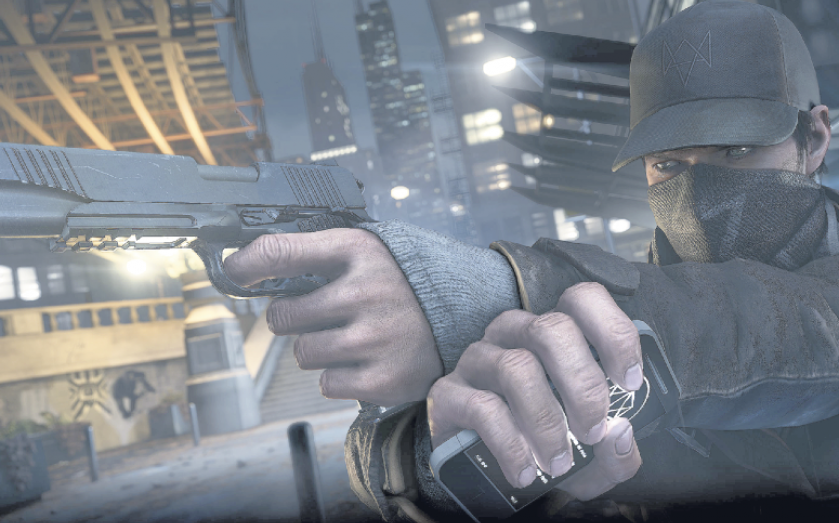Review: Watch Dogs on Xbox One

★★★☆☆
I can’t remember the last game I anticipated quite as fervently as I have Watch Dogs. It's a title that places cyber crime and state surveillance at its heart, making its protagonist’s weapon the connected world; a world it doesn’t take a spectacular mental leap to imagine us all living in.
And, for the first few hours of play at least, I can’t remember being more disappointed. It follows Aiden Pearce, a hacker trying to avenge the death of his niece, who was killed when he got too deep into some murky hacker business. He roams around a sand-box Chicago, elbowing his way into cars and joy riding wherever he pleases (once he gets used to the rather bizarre driving mechanics), finding missions everywhere he goes like a psychotic Littlest Hobo. It sometimes feels like Pearce has strayed onto the set of the latest Grand Theft Auto, which isn’t necessarily a criticism of the developers – Rockstar’s franchise is just so ubiquitous it’s hard not to draw parallels. It also borrows from its Ubisoft stablemate Assassins Creed, with a familiar map on which you can unlock points of interest and side missions by scaling towers.
The original element comes through Aiden’s smartphone, which allows him to "hack" – largely done by pressing “x”, which is perhaps a little simplistic – anything from ventilation ducts to Chicago’s bridges: useful when you're being chased by the cops, as you often are.
Let’s get the bad news over first:
1) Pearce is ridiculous, in a bad way. He’s a hacker, but also somehow a free-runner and black ops specialist, and he speaks like Batman with a cold. Also like Batman, he has decided to go around beating up criminals to assuage his conscience, despite the fact he spends a lot of time raiding the bank accounts of innocent bystanders. And he wears a trench coat that only a teenage boy would think was cool.
2) Finding your way around the (admittedly very beautiful) sub menus and getting the hang of missions is unnecessarily complicated. I’d be walking along, Pearce would start talking about mobsters or some such and suddenly I’d be trying to kill someone. There appeared to be causation involved, but I often had no idea what it was.
3) It fails to capitalise on its innovative premise. It sets up a platform to address all kinds of contemporaneous issues; there are clear parallels between the government-funded ctOS surveillance network that’s gathered a wealth of information on Chicago’s unwitting citizens and the NSA and GCHQ, for example, but the ramifications are left largely unexplored in favour of a rather hackneyed revenge narrative.
4) Did I mention Pearce is ridiculous? He really is.
Then, after a few hours of adjusting to the status quo, of accepting that this isn’t a game I’ll be talking about in a couple of decades, I started to enjoy it. “Hacking” can yield some spectacular results; switching the traffic lights to green and watching the resulting carnage never ceases to bring a smile to your face. Likewise eliminating enemies by hacking nearby environmental weaknesses (blowing up routers and the like), while not the hugely original trick we were promised, adds another dimension to the "crouch and shoot" combat dynamics.
It’s also slick as hell. Much has been made of the graphics being downgraded in the weeks before its release, but it still looks pretty remarkable, especially close-up detail like faces. The online element is nicely integrated – other hackers can challenge you at any point during your game to cat-and-mouse style side quests, in which one player must tail the other to remotely steal information while the other tries to spot his opponent and eliminate him (read: bludgeon him to death). Other nice touches include an iPad app that allows you to play against live opponents, this time taking control of the ctOS police system to try to maintain a semblance of order in Chicago.
Once you get over the niggling problems Watch Dogs reveals itself as a satisfyingly meaty, well executed game. If a little more depth is introduced to the already intriguing concept, the inevitable sequels could prove a welcome addition to the gaming landscape. As it is, its big problem is one of PR: its PR was too good. It promised too much and what we got was just pretty decent.
